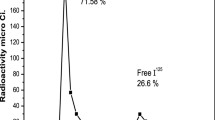Abstract
A monoclonal antibody (H17E2) recognising both placental alkaline phosphatase (PLAP) and testicular PLAP-like alkaline phosphatase was incorporated in a solid phase immunoassay. This was used to measure levels of PLAP in 257 sera from 148 patients with germ cell neoplasms of the testis. High levels of PLAP were found in all patients with active seminomas (mean 0.85 O.D.) compared to those in clinical remission (mean 0.20 O.D.) (P less than 0.0001). More importantly, changing levels of PLAP correlated with the course of disease in 79 samples from 33 patients with seminoma (P less than 0.0001). Elevated PLAP levels were also noted in patients in remission who were smokers (mean 0.32 O.D.) compared to non-smokers (mean 0.15 O.D.) (P less than 0.001). These data demonstrate that determination of PLAP levels using this sensitive immunoassay is an important new adjunct in the monitoring of the response to treatment in patients with seminoma.
Similar content being viewed by others
Rights and permissions
About this article
Cite this article
Epenetos, A., Munro, A., Tucker, D. et al. Monoclonal antibody assay of serum placental alkaline phosphatase in the monitoring of testicular tumours. Br J Cancer 51, 641–644 (1985). https://doi.org/10.1038/bjc.1985.96
Issue Date:
DOI: https://doi.org/10.1038/bjc.1985.96
- Springer Nature Limited
This article is cited by
-
Analysis of serum placental alkaline phosphatase activity in testicular cancer and cigarette smokers
Urological Research (1990)
-
Placental-like alkaline phosphatase in seminoma
Urological Research (1990)
-
Intracranial mixed germ cell tumor with syncytiotrophoblastic giant cells and precocious puberty
Acta Neuropathologica (1988)




